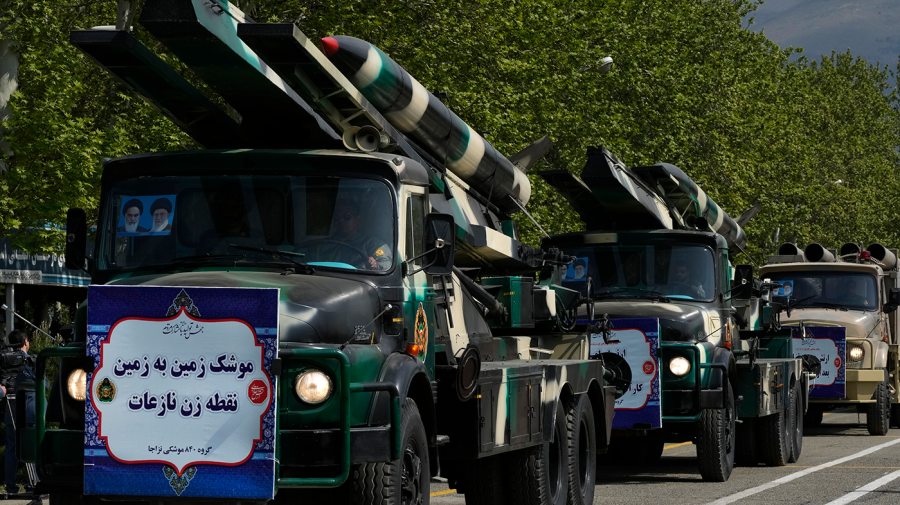Key takeaways from Israel’s calibrated strike on Iran

The Israeli military struck near a major air base and nuclear site in Iran early Friday, in what appeared to be its first military response to Tehran’s attack over the weekend.
Iranian officials claimed the strike, which included at least three drones, hit its military base near the city of Isfahan, in the country’s center. But they also said the attack was ineffective, appearing to downplay the incident.
Israel, meanwhile, also had a muted reaction to what it said was a limited response to Tehran to avoid escalating tensions between the two countries.
Here are the key takeaways from the attack:
Strike was calibrated to avoid escalation
Israel’s strike follows the unprecedented Iranian drone and missile assault on the country on April 13, which Tehran said was retaliation for Israel’s airstrike on the Iranian Consulate in Syria on April 1.
While Israel and Iran have long waged a shadow war, Tehran’s strike — which included hundreds of missiles and drones, nearly all of which were intercepted — was the country’s first direct military attack on Israel.
Israeli officials for the past week had threatened a powerful response, with Prime Minister Benjamin Netanyahu brushing off allies’ calls for restraint.
“I want to be clear: We will make our decisions ourselves. The state of Israel will do whatever is necessary to defend itself,” Netanyahu said during a meeting of his Cabinet.
But Friday, following the relatively small drone attack, Israeli officials were mostly quiet.
Iran President Ebrahim Raisi had also warned that the “tiniest” assault on his country would trigger a “massive and harsh” response. But hours after Israel’s attack, no public calls for retribution had emerged.
The relatively small Israeli response was calculated to prevent the tit-for-tat from further spinning out of control, analysts said.
“The goal was to restore deterrence and discourage any further Iranian attack on the Israeli homeland,” wrote Richard Haass, the president emeritus of the Council on Foreign Relations. ”But the Israeli action was also calibrated to make it easy for Iran not to respond. Israel’s government is not trumpeting what took place.”
And Ali Vaez, director of Iran Project at the International Crisis Group, said Israel merely sought to demonstrate to Iran what it could do, without really doing it.
“By opting to respond in a limited manner, Israel has remained within the gray zone of covert operations, allowing Iran to absorb the attack without the need to retaliate and further escalate while signaling to Tehran that its much larger overt operation failed to deter it,” Vaez posted on the social platform X.
Warning shot toward Iran’s nuclear facilities
The area Israel chose to strike hosts a number of Iranian military sites, including four small nuclear research facilities, the nearby Natanz uranium enrichment site, an air base that contains fighter jets and a missile production factory. A Russian-made S-300 air defense battery is also thought to be in Isfahan.
While Israel’s strike hit the air base, Iran said it did not cause any significant damage to the location and also didn’t affect the nuclear complex.
And satellite images obtained by CNN showed no apparent destruction to the military location.
But the attack’s specific location and retrained scope seemed to be a clear message from Israel to Iran: We can hit you where it hurts, according to former Defense Secretary Mark Esper.
“This wasn’t about destroying Iranian infrastructure or killing Iranians, it was really about sending a message,” Esper said in CNN on Friday. “The message being that ‘we can touch you, we can reach deep into Iran, and we can hit very sensitive sites.’”
Other defense experts made the same assessment.
“Iran’s response to the Damascus strike was a massive escalation. What we’re seeing so far tonight is a very restrained response from Israel with a poignant message: Israel can hit anywhere it wants in Iran and doesn’t need 350 missiles and drones to do it,” Bradley Bowman, senior director of the Center on Military and Political Power at the Foundation for Defense of Democracies, wrote on X.
US stays on the sidelines
Prior to Israel’s strike, President Biden advised Netanyahu to show restraint in any response to Iran’s earlier drone and missile attack, suggesting a counterattack may not be necessary because of the successful interception of Iran’s missiles and drones.
But U.S. officials were not convinced Israel would do nothing, and reportedly asked the ally for advance warning of any planned retaliation.
Following the Friday strike, the White House kept quiet about the incident, reflecting its desire to keep some distance from its ally’s actions.
“I’m not going to speak or speculate about any of the reports that are out there,” White House press secretary Karine Jean-Pierre told reporters Friday.
“We do not want to see this conflict escalate. We continue to consult with our allies and partners, including in the region, to reduce further risk of escalation in the region,” she said.
Other American officials, including Secretary of State Antony Blinken, sought to make clear that Washington had nothing to do with Israel’s choice.
“The United States has not been involved in any offensive operations,” Blinken said Friday at a meeting of the foreign ministers of Group of Seven countries in Capri, Italy.
“You saw Israel on the receiving end of an unprecedented attack, but our focus has been on, of course, making sure that Israel can effectively defend itself, but also de-escalating tensions, avoiding conflict. And that remains our focus,” he added.
Laura Kelly contributed.
For the latest news, weather, sports, and streaming video, head to The Hill.


